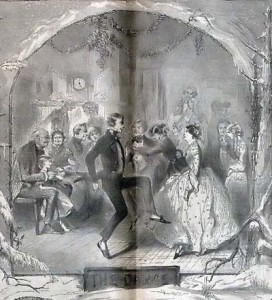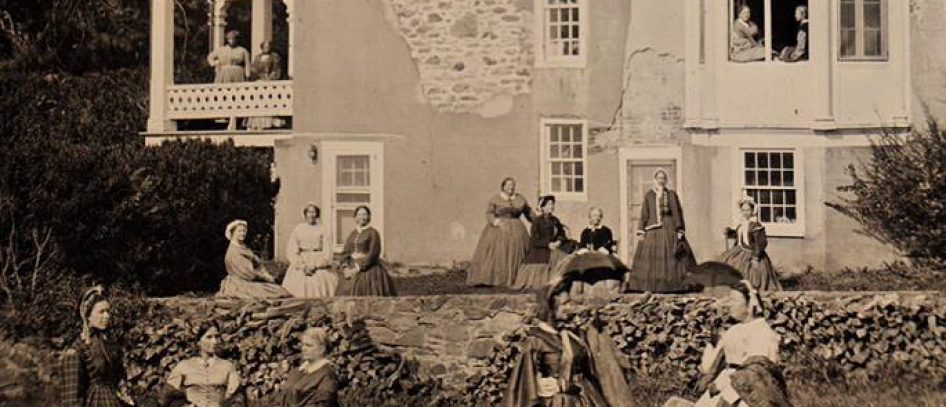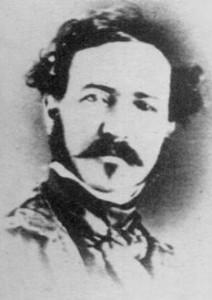Texans fought hard to hang on to their former lives as much as possible. Visiting, barbeques, boating, picnics, evening socials and dances helped maintain a resemblance of normalcy during the war.
Balls and parties frequently surrounded the arrival, presence or departure of the military; often given by the military themselves. “Celebrity” officers such as Magruder and Bee were honored with celebrations. General Magruder was known as a party person in Texas. Whether it was at a spring resort or in residence in Galveston, if Magruder was there, there was a party somewhere; this did not always go over well.
In 1864 The Austin State Gazette described the party scene in Galveston during General Magruder’s residence:
Latest dates from Galveston says the General and Staff still remain there. Balls and supper parties continue to be the order of the day–or rather night. A letter from there in the “news,” dated March 11th, says:
“The complimentary supper to Col. Sulkowski came off very pleasantly to all, was well attended; the dancing room looked very beautiful with the handsome ladies gracefully moving to the excellent music secured for the occasion. The supper was indeed a most elegant affair, arranged with exquisite taste.”
“Elegant affair, arranged with exquisite taste,” while more than half the people in the country are suffering for the necessaries of life! While private property in Galveston is being destroyed to furnish fuel for the soldiers, balls and parties, costing thousands of dollars, are given to the commanding General and his staff, and the boats that might be employed in transporting necessaries to the troops stationed there, find constant employment in carrying pleasure parties between Houston and Galveston.1
Apparently the soldiers agreed with the Gazette. William Neblett, Lizzie Neblett’s husband wrote to her from Galveston regarding the ball:
A ball was given by the ladies of Galveston…The soldiers took offense at the revelry and carousal and concocted a plot to make a raid on the delicacies at the table in order to break it up….But the secret leaked out & got to the ears of Col. Rainey…A Co of cavalry was ord ered to guard the house. ..the ball came off and was largely attended by officers and all the silly women in Galveston & many in Houston who believe that gold lace makes the man and this includes nearly the whole sex.2
ered to guard the house. ..the ball came off and was largely attended by officers and all the silly women in Galveston & many in Houston who believe that gold lace makes the man and this includes nearly the whole sex.2
Lt. Col. Fremantle attended a less formal dance in Galveston and danced an American cotillion “it was very violent exercise, and not the least like any thing I had seen before. A gentleman stands by shouting out the different figures to be performed, and every one obeys his orders with much gravity and energy.”3
In Corpus Christi where Federal occupation continued through reconstruction, townspeople had no reservations about fraternizing with the enemy. Maria von Blücher wrote in 1864 “The town ladies and Yankee officers continually arrange little dances, where all of them seem to entertain themselves tremendously.”4 Maria herself saw nothing wrong with accepting visits from Yankee officers.
Paying calls and visits remained constant during the war. Kate Stone noted that women visited during the day and the gentlemen in the evening. Even Lizzie Neblett paid calls enough for her husband to notice she visited more than she used to.
1 Austin State Gazette. March 16, 1864 page 2 column 1
2 Murr, Erika L. A Rebel Wife in Texas: The Diary and Letters of Elizabeth Scott Neblett 1852-1864. Louisiana State University Press, Baton Rouge, 2001, page 343.
3 Fremantle, Lt. Col. Arthur J.L. Three Months in the Southern States. University of Nebraska Press, 1991, page 73
4 Cheeseman, Bruce S. ed. Maria von Blucher’s Corpus Christi. Texas A&M University Press, College Station, 2002, page 147

